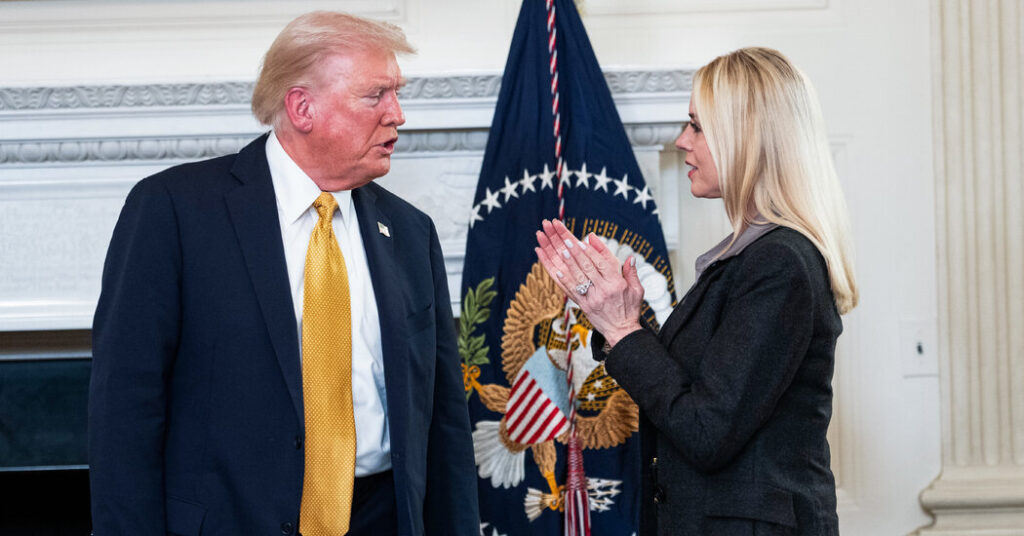Attorney General Pam Bondi’s prosecutorial sprint speed is improving, at least from the perspective of the man holding a stopwatch, President Trump.
Just 217 minutes elapsed between Mr. Trump’s command on Friday morning that she investigate prominent Democrats like Bill Clinton who were named in documents Congress obtained from Jeffrey Epstein’s estate and Ms. Bondi’s announcement that she had referred the matter to the U.S. attorney in Manhattan. Earlier demands took days, sometimes weeks, to fulfill.
Ms. Bondi’s statement was an unmistakable demonstration of Mr. Trump’s near-total success in subordinating the Justice Department’s post-Watergate independence to his will. Friday was a milestone of sorts. The department was deployed, in effect, as an arm of the president’s rapid-response operation to help him muscle through a damaging news cycle, current and former officials said.
“Whether you are investigated or prosecuted, or whether you are pardoned or have your sentence commuted, depends on whether you are an enemy or a friend of Donald Trump,” said Mary McCord, who once oversaw the Justice Department’s national security division and is now a professor at Georgetown Law.
“There is no pretense of evenhanded justice,” she said. “That core principle is gone.”
Mr. Trump has ordered partisan investigations in bulk: James B. Comey, the former F.B.I. director; Letitia James, New York’s attorney general; John O. Brennan, the former C.I.A. director; Adam B. Schiff, a Democratic senator from California; and Jack Smith, the special counsel who twice indicted Mr. Trump, among others.
Friday’s batch consisted of an all-Democratic roster of men who, like Mr. Trump, socialized with Mr. Epstein, a convicted sex offender. They included Mr. Clinton, former Treasury Secretary Lawrence H. Summers, and the megadonor and venture capitalist Reid Hoffman, along with a bank that has longstanding ties to Mr. Epstein.
Several Trump allies, requesting anonymity to speak candidly, conceded that the investigation was an effort to shift attention from messages in the trove that suggested the president knew far more about Mr. Epstein’s abuse of underage girls than he previously acknowledged. Just as important, they said, was Mr. Trump’s need to spin a new narrative to deflect an emerging challenge within his own party: the push to release the remaining Justice Department and F.B.I. investigative files on Mr. Epstein.
On Sunday night, Mr. Trump effectively acknowledged his inability to block the Epstein files as a political narrative. Facing all-but-certain defeat on Capitol Hill, he reversed himself and urged the House to back a measure to compel the Justice Department to release the material from its investigation, a step that he had been seeking to block as recently as Friday.
Ms. Bondi’s quick response on Friday to Mr. Trump’s demand of an investigation into Democrats also amounted to a complete about-face, in her case from her announcement four months ago, when she formally declared that nothing in the Epstein files warranted further investigation.
A department spokesman declined to comment by email, noting that Ms. Bondi and her top deputy “have assembled an outstanding team of U.S. attorneys who are trusted and empowered to diligently uphold the rule of law, prosecute crime and protect our communities.”
The investigation assigned to the U.S. attorney’s office in the Southern District of New York might have more than symbolic importance. If an investigation into any one of the targets suggested by Mr. Trump were to ultimately start, it could allow the Justice Department to refuse to release any further files related to Mr. Epstein by claiming that the disclosures could harm continuing inquiries.
His tirades have real-world consequences. Mr. Comey and Ms. James were recently indicted over the objection of prosecutors who found insufficient evidence to proceed.
But investigations propelled by posts on Truth Social might not have the comparable standing in federal court, or in courts of public opinion, as investigations predicated on evidence. Mr. Trump himself benefited from skepticism about the fairness of his own federal prosecutions, particularly the use of untested legal arguments to charge him with trying to overturn the 2020 election.
These cases have the potential to end in convictions and prison sentences, but the sheer number of them he has demanded may be devaluing their currency to the transactional Mr. Trump. They appear, for now, to be losing some of their initial power to startle, punish, shame and intimidate.
Singling out Mr. Clinton “is noise meant to distract from election losses, backfiring shutdowns and who knows what else,” Angel Ureña, his deputy chief of staff, said in a statement.
Representative Eric Swalwell, Democrat of California and a longtime critic of Mr. Trump’s, responded with a shrug after the Federal Housing Administration made a criminal referral to the Justice Department for mortgage fraud, similar to the charges Ms. James faces.
“The only thing I am surprised about is that it took him this long to come after me,” he said in a statement.
Mr. Trump campaigned on a seemingly contradictory message — to restore the rule of law and to exact revenge — buoyed in part by a long-held belief that federal law enforcement persecuted conservatives, including himself.
“Unfortunately in recent years, a corrupt group of hacks and radicals within the ranks of the American government obliterated the trust and good will built up over generations,” Mr. Trump said in an agenda-setting speech at the department’s Great Hall in March.
“We’re turning the page,” he added.
Since the start of his second term, Mr. Trump has targeted Democrats while offering clemency and pardons to the Jan. 6 rioters and Republicans like George Santos, overturning dozens of decisions made by jurors acting on carefully collected evidence.
At the same time, Mr. Trump hopes to leverage the department’s historical credibility to lend legitimacy to his campaign of retribution.
Thus far, however, almost every investigation involving a high-profile Trump target has been pursued with a slapdash celerity that threatens to hobble their successful prosecution. (The exception is the case of John Bolton, the former national security adviser, who is accused of mishandling classified documents. Even Trump critics believe his prosecution is rooted in evidence.)
A federal magistrate judge handling the Comey case went so far as to suggest prosecutors were engaging in a fishing expedition, accusing them of taking an “indict first, investigate second” approach during a preliminary hearing this month in Alexandria, Va.
In September, the Trump-appointed U.S. attorney assigned to investigate Mr. Comey was replaced after refusing to bring charges. The legality of the appointment of his successor, Lindsey Halligan, hastily installed by the president, is being challenged by lawyers representing Mr. Comey and Ms. James.
The mortgage fraud investigation into Mr. Schiff, conducted by the U.S. attorney’s office in Maryland, has been dragging on for months, but there are signs it remains active, according to people briefed on the matter.
On Nov. 10, Kelly O. Hayes, the U.S. attorney in Maryland, wrote to the general counsel of the House, requesting Mr. Schiff’s correspondence in 2020 related to reporting his mortgage information on ethics forms, and supporting materials related to his claim in 2010 that he lived at his house in Maryland most of the year, according to documents obtained by The New York Times.
That scenario appears to have been repeated in Philadelphia, where another Trump-appointed U.S. attorney was assigned to look into Mr. Brennan’s actions as C.I.A. director in 2017 over his agency’s response to Russian election interference in the 2016 campaign.
This month, the case was abruptly handed off to the U.S. attorney in Miami, Jason A. Reding Quiñones, who is said to be widening the investigation beyond the 2017 time frame as part of his larger effort to investigate what Trump loyalists claim is a “grand conspiracy” by Democrats.
Ms. Bondi has, on occasion, pushed back. For instance, she privately defended Erik S. Siebert — the prosecutor Mr. Trump forced out to secure the Comey indictment — against attacks by William J. Pulte, the director of the Federal Housing Finance Agency, who had urged he be fired.
She was overruled, and at times has been blindsided by actions that would typically have required an attorney general’s sign-off. In October, Ms. Bondi and her top deputy were not given advance notice that Ms. Halligan intended to present the James case to a grand jury.
But in general, Ms. Bondi has been more attentive to her standing in Mr. Trump’s circle than in asserting her autonomy or standing up for the Justice Department’s independence, in the view of critics and some administration officials.
The announcement of an investigation on Friday came in the form of her reply to Mr. Trump’s demand that she go after Democrats linked to Mr. Epstein.
“Thank you, Mr. President,” Ms. Bondi wrote on X.
Glenn Thrush covers the Department of Justice for The Times and has also written about gun violence, civil rights and conditions in the country’s jails and prisons.
The post As Trump Looks for Distraction on Epstein, Justice Dept. Rushes to His Aid appeared first on New York Times.




